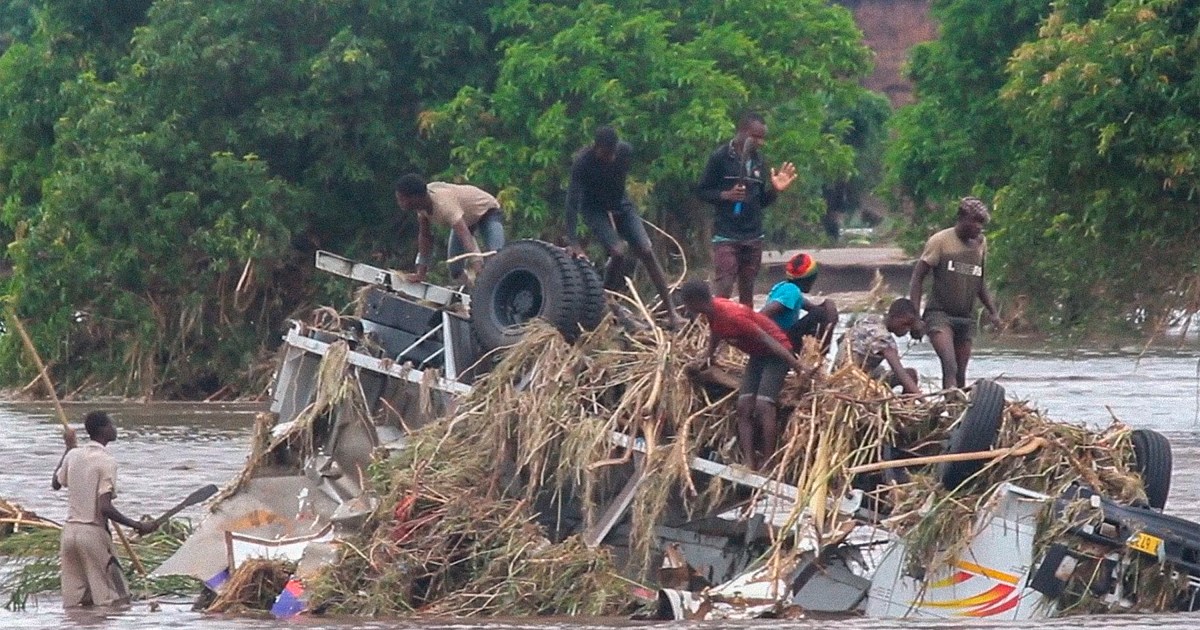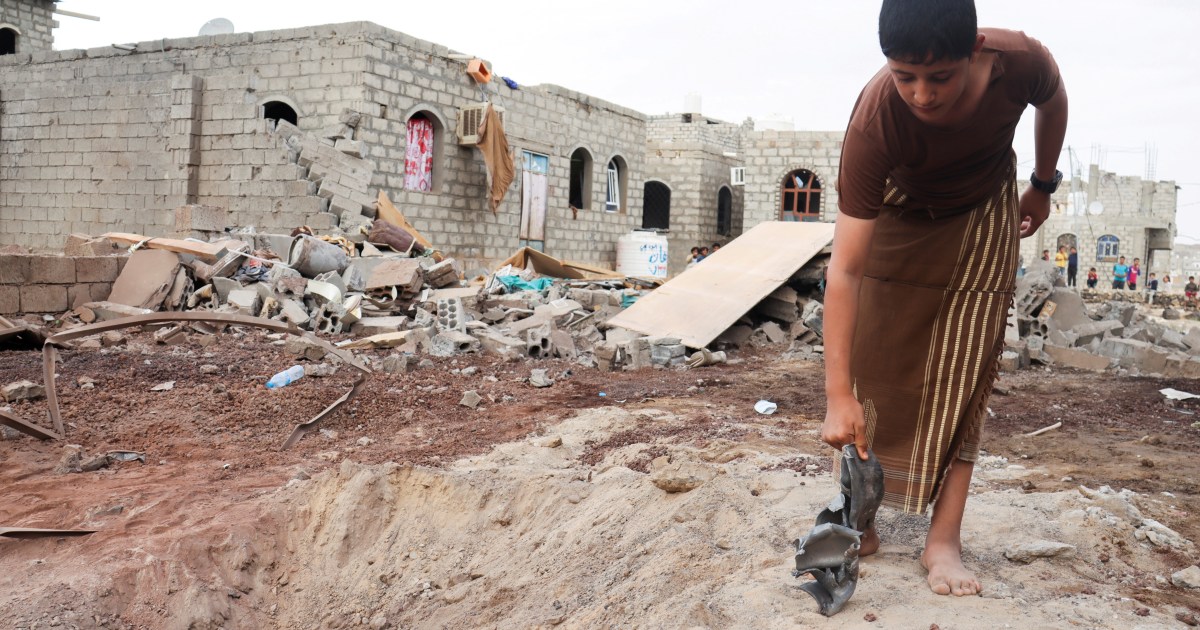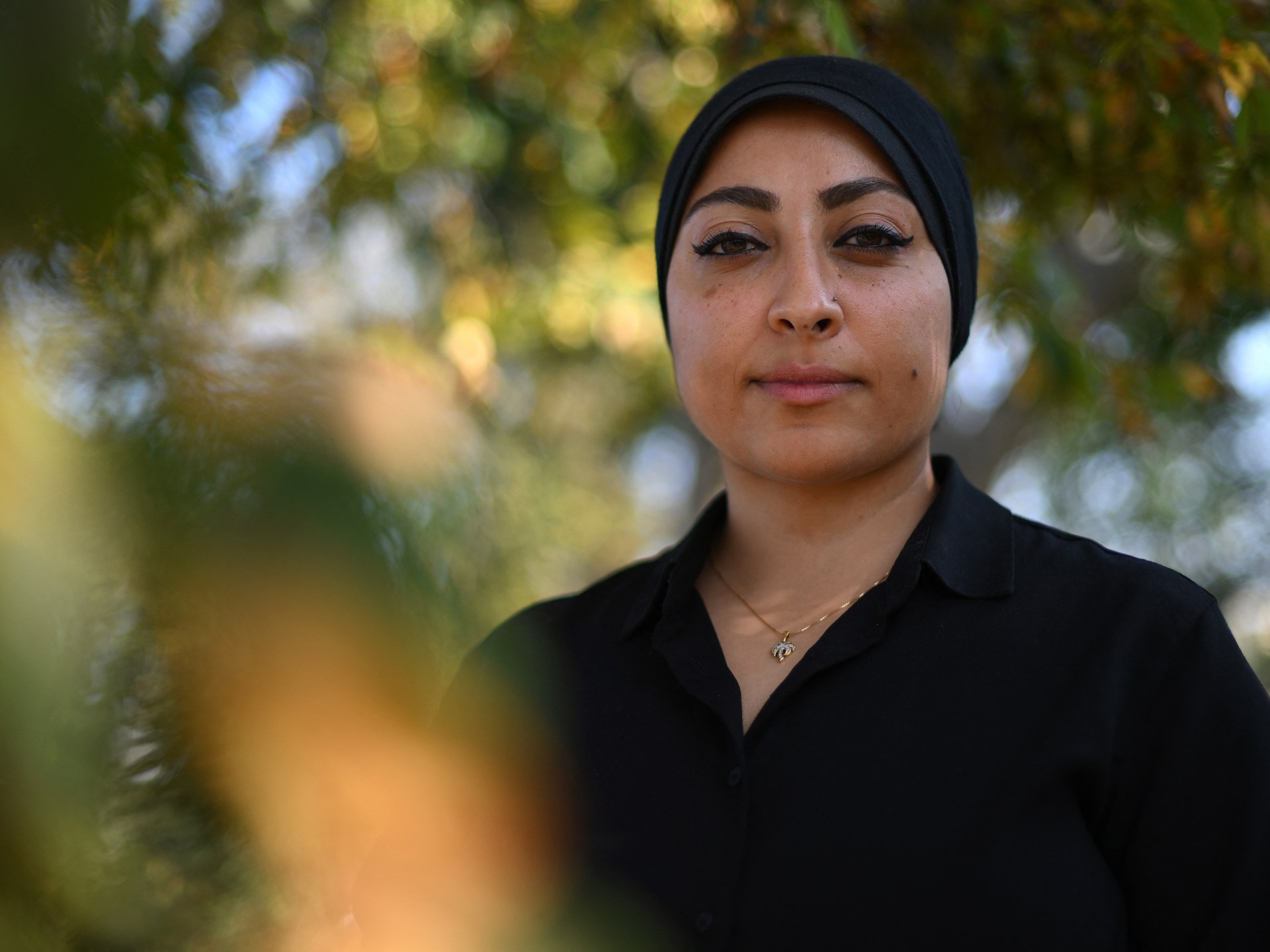Samson’s sacrifice: Malawian chief saves his community from floods | Features News
Chikwawa, Malawi – A few metres away from the joyful shouts of children playing soccer and the low whispers of women hunched together discussing the weather in small groups, Bernard Samson and other men are digging a pit latrine.
Standing at only 1.65m (5ft 4”), Samson, the 44-year-old father of six and district head of the Chikwawa community in southern Malawi, is a man used to leading a tall order.
In January, he sold his livestock to buy land for the 60 members of his community and save them from recurring floods.
“We were sleeping in classrooms at night and staying under the tree during the day,” Samson told Al Jazeera. “We stayed there for almost a week but life was very terrible and unbearable. When I saw how my people especially children and the elderly were struggling, I knew I had to come up with a plan.”
Earlier that month, Tropical Cyclone Ana triggered a landslide in Malawi after sweeping from Madagascar through Mozambique. The windy, heavy downpour that followed forced Samson and his people to seek shelter at the nearby primary school.
It was not the first flood in the district.
Shire River, the largest in the country and the only outlet of Lake Malawi, passes through Chikwawa and the neighbouring Nsanje district before connecting with other rivers and emptying into the Zambezi River in Mozambique.
When it rains in the country, all the water ends up here. A heavy downpour in 2015 and Cyclone Idai four years later caused more damage in both districts than elsewhere in Malawi.
As the frequency and intensity of floods increased in recent years, the damage has been more devastating than ever before.
The latest incident affected a million people in all, according to figures from the Department of Disaster Management Affairs (DODMA). Over two hundred people were displaced, 206 injured and property worth millions of kwachas (hundreds of thousands of dollars) destroyed. There were also 46 deaths.

When it rains, it pours
Medics say that the nearly 100 makeshift camps in Chikwawa district alone are now a breeding ground for infections like diarrhoea, skin and eye infections, malaria and others.
Yet experts say the impact of the floods is still underestimated.
In a recent study on the impact of the cyclone on agriculture systems in both districts, Lilongwe-based agricultural policy think-tank MwAPATA Institute assessed the impact on food security and warns of malnutrition in the nearest future.
“About 42,000 hectares [104,000 acres] of various crops were lost in Chikwawa alone,” William Chadza, its director told Al Jazeera. “One of the key findings was that the crops were at vegetative stage so they had already applied fertiliser. They also lost the important cash crop in the area which is cotton.”
The villagers say the government has not provided any support, such as food and basic necessities and that charities had provided a little.
DODMA spokesperson Chipiliro Khamula did not respond to texts from Al Jazeera on this.
In 2015, DODMA said it managed to get only $80m out of $495m budgeted for “recovery” initiatives in the aftermath of floods, from the treasury.
During 2019’s Cyclone Idai, it said it needed even more to relocate the victims. This year, the department announced it need 68 billion kwacha ($83m) to carry out its four-month disaster recovery plan.
Malawi, one of the poorest countries in the world, is accustomed to budget deficits and is barely able to allocate funds to disaster relief as it struggles to fund healthcare and infrastructure.
Little wonder then that its post-flood response has been too costly to execute, leaving citizens to fend for themselves.
Like thousands of others affected by the cyclone, Samson woke up at midnight when the flood was sweeping houses away with livestock, crops, clothes and other personal possessions. They only had time to grab their children and run to the nearest school for safety.
The 60 people in his community lost all their possessions. But when the chief returned to what used to be his home, he saw that some of his cattle and goats had survived by climbing up a hill – what he called a miracle.
But he told his wife he couldn’t bear seeing his people left with nothing and knew that if they returned to the same homes, they would only be flooded out again.
“There is no way these people could get money and buy land,” he said. “How about we sell this livestock and buy land upland so that they can survive?”
His wife initially hesitated but later relented.
In Malawi, livestock provides a livelihood for people but is also a sign of prestige. Samson sold the livestock at 600,000 kwacha ($750) and used 400,000 ($500) of that to buy the land, then shared it in small portions for each household.
“As you can see, they quickly transformed the place,” he said pointing to dozens of houses made of plastic sheets and poles and thatched with grass. “You should have seen the smile on their faces after hearing the news that I’ve secured them a place to live.”
Jeffrey Mcheka, 75, who watched the floods sweep away his house, seven cows and six goats, said the chief’s sacrifice still leaves him speechless. Having built a makeshift residence, he is unwilling to go back.
“My wish is [now] to have cultivating tools and fertiliser so that I can build a proper house after selling the produce and return to normal life,” he said.

‘An enabling environment’
Leaving the old homestead where their ancestors are buried was a tough call for the villagers.
“The land has been supporting us for years and it’s very fertile,” Samson said, touching his chin and looking downcast. “That’s why we were able to build houses and support our families. But the way water destroyed our homes was very scary and I don’t think anyone would want to see a repetition.”
“We believe that the river is very silted and that is why the flooding is more frequent when it rains and the destruction is more intense,” he said. “I remember my parents telling me that the river was very deep. We need to be careful otherwise more lives will be lost.”
Chadza says people across flood-prone areas should be relocated to higher, safer ground but allowed to maintain gardens in the low-lying lands “because that’s one of the things restraining the relocation” and long-term solutions.
DODMA’s Khamula ruled out the possibility of any relocation soon saying the government is implementing other measures like protecting the villages with dykes, river training and reforestation.
He declined to comment on the amount the department had spent supporting survivors, saying it has to consider partner support before producing a “detailed report”.
Julius Ngoma, coordinator of the Civil Society Network on Climate Change said Chief Samson’s sacrifice is worthy of support by the government and other stakeholders. He also stressed the need for urgent mitigation work given the rising intensity and magnitude of natural disasters due to climate change.
“There are so many things that need to happen…one critical issue is to make sure that we put in place very good early warning mechanism systems to help communities understand the likelihood of some of the risks manifesting into a disaster in their communities,” he said.
In 2015, draft legislation for disaster risk management, which also creates room for establishing an intervention fund, was proposed to parliament.
Seven years later, it is yet to be passed into law.
“There is a lot of inaction by the government”, Ngoma said. “It doesn’t mean that government should do this alone but they should put an enabling environment including legislations so that other players can also come in firmly.”
But as Samson looks over the makeshift houses from his veranda, he is concerned about how his people can return to normal life but also relieved that they are now on safer ground.
“I was in the state of euphoria to see that my people had finally something that they could call a home again,” he said. “It may not be like their previous home but their dignity and privacy was restored.”





Pingback: Loring Ward
Pingback: Buy Burma Mushrooms for sale online USA
Pingback: https://www.dallasnews.com/marketplace/2023/09/29/phenq-reviews-legit-diet-pills-or-fat-burner-scam/
Pingback: kinetisch zand
Pingback: รับผลิตป๊อปคอร์น